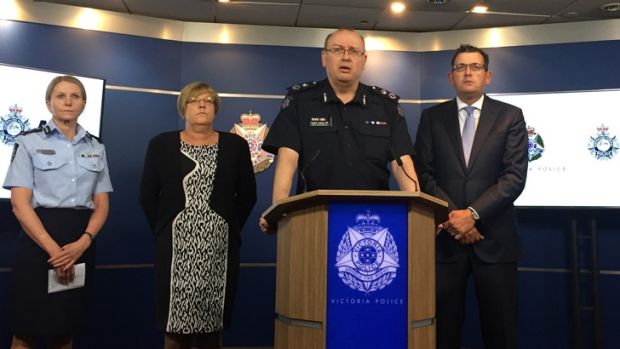Police investigating an alleged terrorist plot in Melbourne feared a multi-person, multi-weapon strike that would include random stabbings, bombings and possible suicide attacks.
Investigators moved on the Melbourne Christmas Day terror suspects on Thursday night to thwart what they believed would be a co-ordinated multi-target attack in the CBD.
More Victoria News Videos
Authorities assure Melburnians over holiday safety
Speaking from the site of a potential terrorist attack on Saturday, the Victorian Police Chief Commissioner, the Victorian Premier and the Lord Mayor of Melbourne urged residents and visitors to use the city as normal.
The decision to arrest was made in the last five days after some of the suspects were alleged to have conducted surveillance operations near Federation Square, St Paul's Cathedral and Flinders Street Station.
The alleged plot was designed to create maximum casualties and widespread panic.
Intelligence officers suspected general duties police would be targeted when they responded to initial emergency calls.
Up to 400 Federal and Victorian Police were used on Operation Kasselholm, which culminated in a series of raids in Melbourne's north-west on Thursday night and Friday morning.
Forensic and bomb experts were on Friday examining the properties for traces of explosives.
Victoria's Chief Commissioner Graham Ashton confirmed police had seized "the makings of an improvised explosive device".

Computers were also being checked for links to terror websites.
While police would have preferred to allow the prearrest investigation to have continued another 48 hours, fears the suspects may have mounted an earlier attack prompted the raids.

Six men and one woman, aged between 20 and 26 were arrested. Two men and the woman were later released without charge.
Some of those arrested were on a police watch list of about 300 potential terror suspects but none were deemed as prime risks until two weeks ago.

"They were seen as peripheral until then," one source said.
It is believed counter-terror police used forensic psychologists to grade the risks of the suspects carrying out the proposed attacks.

Operation Kasselholm investigators will now begin sifting through evidence found during the raids and attempt to identify any further suspects involved in the planning.
Police will claim some of the suspects self radicalised by accessing Islamic State propaganda in recent weeks.

IS has been urging supporters worldwide to target churches, shops and public gatherings during Christmas.
In the last month, police in Britain, France and Belgium have arrested terror suspects allegedly preparing for IS-motivated Christmas attacks.
The British arrests related to a plot to attack pre-Christmas crowds in shopping centres while the French markets and Belgian carnivals were also identified as Christmas targets.
In Berlin, 12 people were murdered when terrorists drove a truck into Christmas market crowds and German police foiled a second market bombing in another city.

The US State Department issued a warning to its citizens that self-radicalised IS sympathisers were planning to attack European churches over Christmas.
Chief Commissioner Ashton said: "Over the last fortnight … we have had to conduct a criminal investigation relating to the formation of what we believe was a terrorist plot".
"We believe that there was an intention to conduct what we call a multi-mode attack, possibly on Christmas Day," he said.
One investigator described the suspects as "unsophisticated but potentially extremely dangerous".
Mr Ashton said police believed the attack "would involve an explosive event, the use of explosives, and we gathered evidence to support that".
"There has also been evidence that we will lead around the possibility of an intention to use other weapons. That could include knives and or a firearm," he said.
"Certainly these [people] are self radicalised, we believe, but inspired by ISIS and ISIS propaganda."














